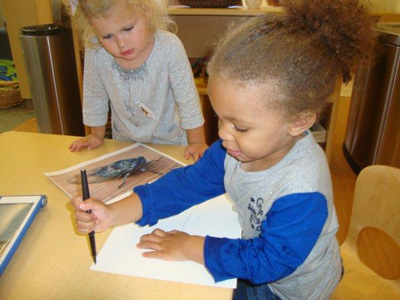Curriculum Content
 The Early Childhood Center’s (ECC) curriculum framework is guided by statements that convey how the program philosophy is contextualized. As each teacher translates our philosophy into the day-to-day planning process to design and plan classroom activities, we keep the following statements in mind with respect to different content areas in the curriculum.
The Early Childhood Center’s (ECC) curriculum framework is guided by statements that convey how the program philosophy is contextualized. As each teacher translates our philosophy into the day-to-day planning process to design and plan classroom activities, we keep the following statements in mind with respect to different content areas in the curriculum.
Social/Emotional Competence: The learning environment should encourage development of children’s’ positive self-concepts by enabling them to cope with setbacks and frustrations without losing self-confidence. Children are supported as they learn to make choices, assume responsibility, become independent, express feelings and needs in words, and participate in creating and abiding by the rules established for behavior in the classroom environment. ECC children learn to respect others’ feelings, choices and opinions.
Nature Education and Ecological Responsibility: As members of the ECC community, children have the opportunity to develop a sense of responsibility for each other and their natural environment and resources. Gardening, recycling, and care of the physical and natural environment are an increasing part of our curriculum as we look for ways to help children develop an awareness of the importance of a sustainable and ecologically respectful global environment.
Social Studies: Children’s’ awareness of themselves and the world is developed by establishing respectful and supportive classroom communities that focus on the sharing of cultures, customs, language, and traditions of the families in the class. They learn about their immediate world with many field trips, experiences, and interactions with people and places in the local community.
Language Arts & Emergent Literacy: Multiple literacies develop through daily experiences and practice with many forms of communication. Making extensive use of high-quality, culturally responsive literature, modeling, recording, and revisiting conversations and discussions, and generating literacy products such as books, charts, and letters, enables children to progress from the acquisition of language to the productive use of oral and written language to express original ideas.
Physical Development: Physical development occurs both naturally through various kinds of play and intentionally by planning opportunities and activities to strengthen and refine fine and gross motor skills. We are fortunate to have a partnership with the Kinesiology program, where our preschools visit the Vadalabene Center two hours a week where they are paired with a Kinesiology student who develops physical experiences that the child’s body coordination, balance, agility, and spatial awareness.
Art: Recognizing that supporting and encouraging creativity is important for the development of the whole child, children need frequent opportunities to express and explore their ideas in many ways. They need exposure to a wide variety of flexible materials that can be used in different ways. The arts are a primary means by which cultures represent their history, achievements, and values; therefore, exposure to a wide variety of visual arts, music, dramatic, and movement activities is essential. They are the “hundred languages of children.” (Edwards, Gandini & Forman, 1993; 1998).
Music: Every Tuesday the children in our Young Preschool classrooms enjoy Kindermusik. Kindermusik is a music and movement program with curriculum for children ages birth through seven years old that provide a holistic musical and learning experience. This developmental program is guided by a proven methodology combining music and childhood development. It is taught by trained and licensed Kindermusik educator Ellen Singh. https://www.siue.edu/artsandsciences/music/suzuki/kindermusik.shtml
Every Friday children enjoy songs, finger plays and story time with Storyteller Mary Anne Posnanski.
Math: Children acquire fundamental mathematical concepts, logical thinking and problem solving through the manipulation of materials and application of skills and concepts to real life situations. Concepts learned through work with manipulatives, block-building, sand and water play, and problem posing/solving embedded in group project work include one-to-one correspondence, patterning, counting, sorting, comparing, shape recognition, addition, and subtraction.
Science: Children are innately curious about the natural world and their environment; they develop science process skills through observing, classifying, measuring, communicating, inferring, predicting, and experimenting with familiar objects, animals, and natural processes. Experimenting, learning through trial-and-error, hypothesizing, and developing systematic inquiry processes take time and repeated opportunities to discover how things move, grow, and change. Cooking activities also offer practical and meaningful examples of how scientific principles are applied in daily life.
[1] Copple, C. & Bredekamp, S. (2009). Developmentally appropriate practices for children in programs aged birth–eight. Washington, DC: NAEYC.
[2] Edwards, Gandini & Forman, (1993; 1998). The Hundred Languages of Children The Reggio Emilia Experience in Transformation. Santa Barbara, CA: ABC-CLIO,LLC











